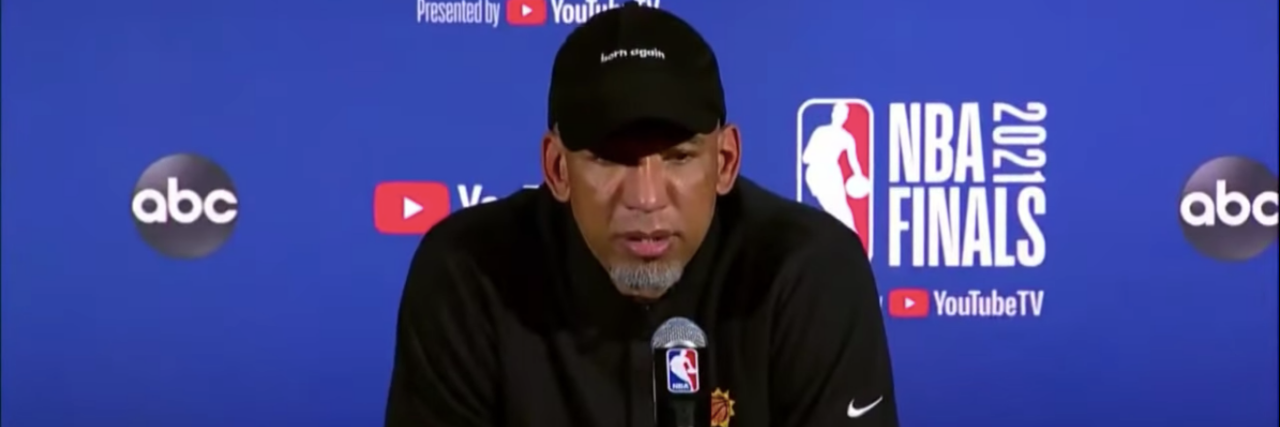During the recent NBA Finals post-game interview, Phoenix Suns head coach Monty Williams was asked to share lessons he learned from his team getting to this point, losers of the championship, but victors in their own right. What followed was a display of vulnerability, heartache and raw emotion.
“I just don’t take it for granted. It’s hard to get here. And uh, I wanted it so bad, you know? It’s hard to process right now. It’s hard, you know? That’s all.” Williams said this, not all at once, but eventually, with cracks in his voice, tears behind eyes, a tremble here and there.
We saw a man shrouded in pain.
Five years and 5 months ago, Ingrid Williams, his wife of over 20 years, died in a tragic automobile accident in South Oklahoma City. So, when Williams reflected sorrowfully from the interview podium, he was undoubtedly carrying the heaviness of losing someone, a loss which always seemed to occur yesterday, no matter how long it’s been. He’s spoken openly about grief, raising their five children and his moments where getting to the next day felt impossible.
To witness such emotional vulnerability displayed by a Black man within the sports industry, where strength and peak performance reign above all, is powerful, and speaks to me as a Black man. Growing up, at times, feelings outside of happiness were discouraged, only to be packed away along with guilt, anger, frustration and regret. Sadness was something to get through. Weakness wasn’t an option.
I remember learning about relatives who passed away weeks after their bodies were cold in the ground. “We didn’t want you to worry,” was all anyone said. Though well-meaning and appreciated, I developed an ability to distance myself. To only get but so close, protecting myself. Same for other feelings, responses to painful circumstances, even an accident I experienced. Still, it wasn’t all bad. Along the way, there were loving aunties who encouraged emoting, therapists who bore my secrets, men who served as mentors who’d listen and close friends who welcomed authenticity.
Though Black men are not a monolith, many of us have expertly self-reinforced the message it’s not OK to cry, or emote, when in fact crying, grieving, taking it out on the punching bag are all necessary. They’re as necessary as eating, drinking water, bathing and sleeping. Grief takes a toll on our bodies. We’re at a deficit when we repress our emotions. Many of us hurt in silence when the lights are out. There’s no shame in that. No guilt for how we compartmentalize, cope. We’re doing the best we can, careful to not appear as the “angry Black man” in the office or during a traffic stop, mindful of our temperament as not to appear unqualified.
We’re shifting the narrative through our actions. Men like Williams have taken it upon themselves to bravely serve as reminders that our healing isn’t found avoidance or in hiding, rather it’s quite the opposite. In a 2017 Sports Illustrated article titled, “‘You Can’t Give In’: Monty Williams On Life After Tragedy,” Willams said this about grief: “I’m not grieving for her, you know. She’s in heaven, she’s with the Lord, she’s like, balling right now. You grieve because you don’t have what you had.”
Truly, we get to grieve when what we had is no longer there. The sweetness of victory, the peace of mind before COVID-19, a loved one who’s no longer themselves, friends who’ve left without reason. For me, I’m grieving the life we had before it was snuffed out by bipolar disorder. Writing helps me process. Dancing and playing with our 2-year-old brings levity and true joy. Having a wife who’s willing to go to those darker places with me has made all the difference.
My prayer life sustains me. But none of this would be possible if I hadn’t done the difficult work of saying, “I feel weak. I don’t know what I’m doing. I just want to give up.” Facing down negative feelings, working toward liberation. Similar to how he calls his players in during huddles, getting eye to eye with them, naming the challenge of the moment, Williams called us in as men to remind us that who we are is multidimensional, life is complex and part of the game, so to speak, is disappointment, defeat and simultaneously an opportunity to learn more about what we’ve been holding on to. Losing yourself doesn’t mean you’ve lost, it means you’ve found something that needs mending.
Lead image via YouTube

